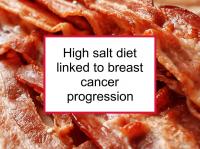High salt (sodium chloride) consumption is associated with a variety of degenerative diseases. Evidence is strong that it contributes to heart disease and stroke. It also appears to be linked directly to digestive tract cancers. Existing research regarding salt and breast cancer points to an association, but the link does not appear to be strong.
It is difficult to separate the effects of high salt from other aspects of a typical U.S. unhealthy diet such as high saturated fat consumption (which is known to increase breast cancer risk). Part of what has been missing in establishing a link between high salt intake and breast cancer is to describe how exactly salt could interact with breast tissue to cause or promote breast cancer development. Now a new study has described a mechanism of action by which a high salt diet could promote breast cancer metastasis and accelerate its progression.
Latest research shows how high salt diet could promote metastasis
The study referenced above was designed to investigate the role of a high salt diet in the progression of breast cancer in an animal model of breast cancer. The authors also examined how such a diet influences the tumor microenvironment. To conduct the study, the authors used MMTV-PyVT mice, who form mammary tumors spontaneously. The mice were divided into groups and fed either a specially designed high salt (sodium chloride) diet or a normal control diet. The authors also performed cellular experiments to understand the mechanism of action of high levels of salt.
The high salt diet was found to accelerate the development of mammary tumors and subsequent lung metastasis in MMTV-PyVT mice compared to the normal diet. Furthermore, mice on the high salt diet were found to have an increased proportion of Th17 lymphocytes in circulation, in tumor tissue, and in draining lymph node tissue. Th17 cells are a type of pro-inflammatory T cell which mediate the recruitment of neutrophils and macrophages to tissues requiring an immune response.
Laboratory co-culture of Th17 cells from mice on the high-fat diet with MCF-7 ER+/PR+ breast cancer cells increased proliferation, migration and invasion of the breast cancer cells. These increases in aggressive behaviors on the part of the breast cancer cells were reversed by the addition of 1,25-vitamin D3 (which served to inhibit differentiation of the Th17 cells). Co-culture with Th17 cells also was found to activate MAPK/ERK signaling (which helps regulate proliferation) in MCF-7 cells—such signaling was able to be inhibited by the administration of an ERK inhibitor. The authors conclude that high salt intake accelerated the growth of breast cancer and facilitated lung metastasis in a mouse model of breast cancer.
Please see our salt page for more information.
